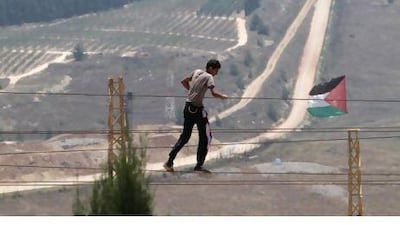MAROUN AL RAS // It is not just the replica of Jerusalem's Dome of the Rock, or Qubbat Al Sakhra, that makes the park in this Lebanese village special, even unique.
There is also the park's name, the Iran Garden, named after the country that funded its construction and dedicated during a visit to south Lebanon last year by its president, Mahmoud Ahmadinejad.
Then there is the observation tower standing near the park's paintball course, from where people can get a bird's-eye view of the "Zionist entity" - Israel.
In other words, for the visitors who flock each weekend to the Iran Garden, located on a village on Lebanon's border with Israel, it is not your typical weekend in the country.
The savvy mayor of Maroun Al Ras knows how to sell the main attraction of his community, which achieved prominence in the 2006 war between Israel and Lebanon when Hizbollah forces engaged invading Israeli armour units in days of fierce fighting for control of its narrow, winding streets.
"The Iranians gave it [the park] as a gift for the martyrs of Maroun Al Ras," Ibrahim Allawi said. "The idea was to show the enemy that not only are we masters of war, but we are also masters of beauty. It's a spot where you feel pride that you can stand and reach out and grab Palestine with your hand."
The ability to "grab Palestine with your hand" is why, however, the Iran Garden could suddenly become a battlefield and any idyll there sour.
Cross-border incidents, such as Israeli reconnaissance flights violating Lebanese airspace, are routine. Troop manoeuvres take place along the Blue Line, the unofficial border to which Israel withdrew after its two-decade occupation of southern Lebanon. United Nations peacekeepers monitor the frontier for ceasefire violations.
In May, tens of thousands of protesters calling for the right of return for Palestinian refugees descended on Maroun Al Ras. Israeli troops opened fire when a few hundred protesters pushed down into the valley and approached the fence that runs along the Blue Line, killing six Palestinians. Israel claimed its soldiers fired warning shots after "rioters attempted to breach the border".
Sitting in the sunshine at the Iran Garden, the violence that has scarred the border region for decades appeared distant memories for visitors, including the Saloom family from the southern Lebanese city of Nabatieh.
"When we survived the July War [with Israel in 2006] we felt we achieved something. We are happy to be in a place that was occupied by Israel and now it's normal here," said Nada Saloom as her one-year-old daughter Mariam wriggled in her lap. "But we're used to being close to the border."
Firas Birjawi, a Canadian of Lebanese origin, however, found it more difficult to comprehend that he was gazing out into Israeli territory just a few hundred metres away.
"It feels good because before you probably couldn't just stand here," the 20-year-old law student said. "It feels a bit unreal, thinking about how the whole south [of Lebanon] was under occupation."
Maroun Al Ras wears its defiance proudly. Loudspeakers dotting the grounds of the Iran Garden crackle to life throughout the day, pounding out resistance anthems that echo into the valley. Pictures of the village's martyrs who died fighting Israel and the flags of Hizbollah and Amal, another Shiite group, adorn its streets - symbols of Lebanon's resistance against Israel.
Work on the Iran Garden started several months after the ceasefire in 2006 that brought an end to the 33-day war, which left much of Maroun Al Ras devastated.
"We are one of the villages that has stood steadfast against Israel," Mr Allawi said. "Believe me, as civilians, we feel so much pride being here - definitely more than people in the capital. When the victories happen, we see them happen on our land."
On the veranda of a yellow house being built on the side of the slope that runs down to a fence marking the border, Abbas Faris smoked a shisha pipe. A university student in Beirut, Mr Faris, 20, said he returns to his hometown whenever he can.
"We grow tobacco right by the fence, It doesn't bother us," he said. "We feel strong living here. Some people are afraid of being so close to the border. But we love the idea that one day we are going to Palestine from here."

